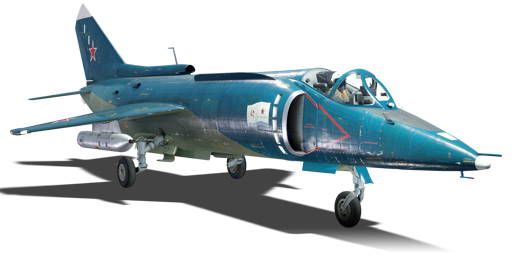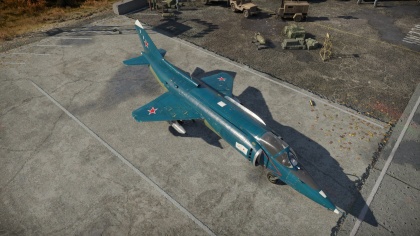Difference between revisions of "Yak-38"
(→Pros and cons) (Tag: Visual edit) |
(→Pros and cons) |
||
| Line 218: | Line 218: | ||
* Subsonic | * Subsonic | ||
* Cannot use thrust vectoring in cruise flight or combat, unlike the Harriers - nozzles and lift engines automatically disengage at cruise speed | * Cannot use thrust vectoring in cruise flight or combat, unlike the Harriers - nozzles and lift engines automatically disengage at cruise speed | ||
| − | * No airbrakes, can be difficult to bleed enough speed for a regular landing | + | * No airbrakes, can be difficult to bleed enough speed for a regular landing, though it can use its VTOL engines as an airbrake once slower than 500 km/h |
* Vertical landings require careful consideration of your velocity bleed. | * Vertical landings require careful consideration of your velocity bleed. | ||
* Somewhat fragile gear means careless landings can cause the plane to smash into the strip or carrier deck | * Somewhat fragile gear means careless landings can cause the plane to smash into the strip or carrier deck | ||
Revision as of 11:13, 24 November 2020
Contents
Description
The Yak-38 is a premium gift rank Soviet naval jet fighter
with a battle rating of (AB), (RB), and (SB). It was introduced in Update "New Power".
General info
Flight performance
| Characteristics | Max Speed (km/h at 0 m - sea level) |
Max altitude (metres) |
Turn time (seconds) |
Rate of climb (metres/second) |
Take-off run (metres) | |||
|---|---|---|---|---|---|---|---|---|
| AB | RB | AB | RB | AB | RB | |||
| Stock | 1,190 | 1,186 | 40.0 | 41.2 | 77.4 | 70.5 | 520 | |
| Upgraded | 1,207 | 1,199 | 37.3 | 38.6 | 113.1 | 94.3 | ||
Details
| Features | |||||
|---|---|---|---|---|---|
| Combat flaps | Take-off flaps | Landing flaps | Air brakes | Arrestor gear | Drogue chute |
| X | ✓ | ✓ | X | X | ✓ |
| Limits | ||||||
|---|---|---|---|---|---|---|
| Wings (km/h) | Gear (km/h) | Flaps (km/h) | Max Static G | |||
| Combat | Take-off | Landing | + | - | ||
| N/A | 650 | 500 | ~12 | ~5 | ||
| Optimal velocities (km/h) | |||
|---|---|---|---|
| Ailerons | Rudder | Elevators | Radiator |
| < 650 | < 850 | < 920 | N/A |
Engine performance
| Engine | Aircraft mass | |||||
|---|---|---|---|---|---|---|
| Engine name | Number | Basic Mass | Wing loading (full fuel) | |||
| Tumansky R-27V-300 (main) | 1 | 6,645 kg | 502 kg/m2 | |||
| RD-36-35FV (lift jets) | 2 | |||||
| Engine characteristics | Mass with fuel (no weapons load) | Max Takeoff Weight | ||||
| Weight (each) | Type | 7m fuel | 20m fuel | 23m fuel | ||
| 1,350 kg (main) | Vectored-thrust low-bypass turbofan | 7,482 kg | 9,036 kg | 9,395 kg | 10,300 kg | |
| 198 kg (lift jet) | Axial-flow turbojet | |||||
| Maximum main engine thrust @ 0 m (RB / SB) | Thrust to weight ratio in level flight @ 0 m (100%) | |||||
| Condition | 100% | WEP | 7m fuel | 20m fuel | 23m fuel | MTOW |
| Stationary | 6,600 kgf | N/A | 0.88 | 0.73 | 0.70 | 0.64 |
| Optimal | 6,600 kgf (0 km/h) |
N/A | 0.88 | 0.73 | 0.70 | 0.64 |
| Maximum lift engine thrust @ 0 m (RB / SB) | Thrust to weight ratio in VTOL (all 3 engines) @ 0 m (100%) | |||||
| Stationary | 2,840 kgf | N/A | 1.56 | 1.29 | 1.24 | 1.13 |
Survivability and armour
The Yak-38 has no armour. It is a fairly large target with the entire fuselage being taken up with engines and fuel tanks.
Armaments
Offensive armament
The Yak-38 is armed with:
- A choice between two presets:
- Without offensive armament
- 1 x 23 mm VSPU-36 ventral gun pod containing a GSh-23L cannon (160 rpg)
Suspended armament
The Yak-38 can be outfitted with the following ordnance:
- 2 x 23 mm GSh-23L cannons (250 rpg = 500 total)
- 4 x 23 mm GSh-23L cannons (250 rpg = 1,000 total)
- 10 x 100 kg OFAB-100 bombs (1,000 kg total)
- 2 x 250 kg OFAB-250sv bombs (500 kg total)
- 4 x 250 kg OFAB-250sv bombs (1,000 kg total)
- 2 x 500 kg FAB-500M-54 bombs (1,000 kg total)
- 2 x 500 kg FAB-500M-54 bombs + 2 x 250 kg OFAB-250sv bombs (1,500 kg total)
- 64 x S-5KP rockets
- 64 x S-5KP rockets
- 96 x S-5KP rockets
- 40 x S-8M rockets
- 2 x S-24B rockets
- 4 x S-24B rockets
- 32 x S-5KP rockets + 2 x S-24B rockets
- 2 x R-60 missiles
- 2 x R-60 missiles + 2 x 100 kg OFAB-100 bombs (200 kg total)
- 2 x R-60 missiles + 2 x 250 kg OFAB-250sv bombs (500 kg total)
- 2 x R-60 missiles + 32 x S-5KP rockets
- 2 x R-60 missiles + 2 x S-24B rockets
- 2 x Kh-23M missiles + 1 "Delta" guidance pod
Usage in battles
Describe the tactics of playing in the aircraft, the features of using aircraft in a team and advice on tactics. Refrain from creating a "guide" - do not impose a single point of view, but instead, give the reader food for thought. Examine the most dangerous enemies and give recommendations on fighting them. If necessary, note the specifics of the game in different modes (AB, RB, SB).
Modules
| Tier | Flight performance | Survivability | Weaponry | |||
|---|---|---|---|---|---|---|
| I | Compressor | Fuselage repair | Gun pod VSPU-36 | FAB-250 | UB-16 | |
| II | New boosters | Airframe | Gun pod UPK-23-250 | FAB-500 | UB-32 | R-60 |
| III | Wings repair | G-suit | Offensive 23 mm | X-23M | B-8M1 | |
| IV | Engine | Cover | New 23 mm cannons | C-24 | ||
| This is a premium vehicle: all modifications are unlocked on purchase | ||||||
Pros and cons
Pros:
- VTOL capability
- Fast acceleration - one of the fastest subsonic jets, can quickly hit Mach 0.98 quickly in level flight!
- Plenty of payload options (20 setups)
- Has access to the very efficient S-24B rockets and Kh-23M AGMs, as well as R-60 AAMs
- CCIP for its guns and rockets mean you can easily target enemy ground units - S-24B rockets are especially effective
Cons:
- Subsonic
- Cannot use thrust vectoring in cruise flight or combat, unlike the Harriers - nozzles and lift engines automatically disengage at cruise speed
- No airbrakes, can be difficult to bleed enough speed for a regular landing, though it can use its VTOL engines as an airbrake once slower than 500 km/h
- Vertical landings require careful consideration of your velocity bleed.
- Somewhat fragile gear means careless landings can cause the plane to smash into the strip or carrier deck
- Very high RPM combined with low RPG count means you have to be very careful when using the gun(s)
History
Devblog
Although Soviet engineers were experimenting with VTOL fixed wing aircraft design since the early 1960's, it wasn't until December 1967 before a formal order to develop a light VTOL strike aircraft as well as a corresponding trainer version was issued. As a result, engineers at the Yakovlev design bureau began work on the new aircraft in the late 1960's, basing their design on experience gained from developing the preceding Yak-36 - an early VTOL demonstration design.
The new aircraft, designated Yak-36M, was being developed for immediate frontline service, operating both from land bases as well as aircraft-carrying ships. The aircraft's primary role was that of a strike aircraft, engaging ground and surface targets while also being suited to intercept enemy aircraft and helicopters if necessary.
Not too long after work on the project began, the first prototype saw completion and conducted its maiden flight in December 1970. Subsequent prototypes and trials continued testing the aircraft's performance, particularly its novel VTOL capabilities. By 1973, the aircraft was considered ready and serial production commenced.
After some further testing and crew training, the aircraft officially entered service with the Soviet Navy in August 1977, receiving the designation Yak-38. By 1982, over 140 Yak-38's were built, all of which served aboard the then new Kiev-class aircraft carriers. In the mid 1980's, the modernized Yak-38M version came into service, most prominently featuring more powerful engines as well as other improvements. About 50 Yak-38M's were built before the type was ultimately decommissioned in 1991.
Media
Excellent additions to the article would be video guides, screenshots from the game, and photos.
See also
Links to the articles on the War Thunder Wiki that you think will be useful for the reader, for example:
- reference to the series of the aircraft;
- links to approximate analogues of other nations and research trees.
External links
| USSR jet aircraft | |
|---|---|
| Bereznyak-Isayev | BI |
| Yakovlev | Yak-15 · Yak-15P · Yak-17 · Yak-23 · Yak-28B · Yak-30D · Yak-38 · Yak-38M · Yak-141 |
| Mikoyan-Gurevich | MiG-9 · MiG-9 (l) · MiG-15 · MiG-15bis · MiG-15bis ISh · MiG-17 · MiG-17AS · MiG-19PT |
| MiG-21F-13 · MiG-21PFM · MiG-21S (R-13-300) · MiG-21SMT · MiG-21bis | |
| MiG-23M · MiG-23ML · MiG-23MLD · MiG-27M · MiG-27K | |
| MiG-29 · MiG-29SMT | |
| Lavochkin | La-174 · La-15 · La-200 |
| Sukhoi | Su-9 · Su-11 |
| Su-7B · Su-7BKL · Su-7BMK · Su-17M2 · Su-17M4 · Su-22M3 | |
| Su-24M | |
| Su-25 · Su-25BM · Su-25K · Su-25T · Su-25SM3 · Su-39 | |
| Su-27 · Su-27SM | |
| Su-34 | |
| Ilyushin | IL-28 · IL-28Sh |
| Tupolev | Tu-14T |
| USSR premium aircraft | |
|---|---|
| Fighters | Krasnolutsky's I-15bis · I-16 type 28 · Zhukovsky's I-153-M62 · I-153P · I-180S · I-301 · ITP (M-1) |
| LaGG-3-4 · LaGG-3-23 · LaGG-3-34 · Dolgushin's La-7 · La-11 | |
| Eremin's Yak-3(e) · Yak-3 (VK-107) · Yak-3T · Golovachev's Yak-9M | |
| ▂P-39K-1 · ▂Pokryshkin's P-39N-0 · ▂P-39Q-15 · ▂P-40E-1 · ▂P-47D-27 · ▂P-63A-5 · ▂P-63A-10 · ▂P-63C-5 | |
| ▂Hurricane Mk IIB · ▂Spitfire Mk IXc · ▂Fw 190 D-9 | |
| Twin-engine fighters | I-29 |
| Jet fighters | Su-11 · MiG-15bis ISh · MiG-17AS · MiG-21S (R-13-300) · MiG-23ML |
| Strike aircraft | IL-2M "Avenger" · IL-2 M-82 · IL-8 (1944) · Su-6 · Tandem MAI · TIS MA · Su-8 · Tu-1 |
| Yak-38 · Su-7BMK · Su-25K · Su-39 | |
| Bombers | Po-2M · Be-6 · MBR-2-M-34 · Pe-2-205 · TB-3M-17-32 |
| ▂PBY-5A Catalina · ▂Hampden TB Mk I · ▂A-20G-30 · ▂B-25J-30 | |





